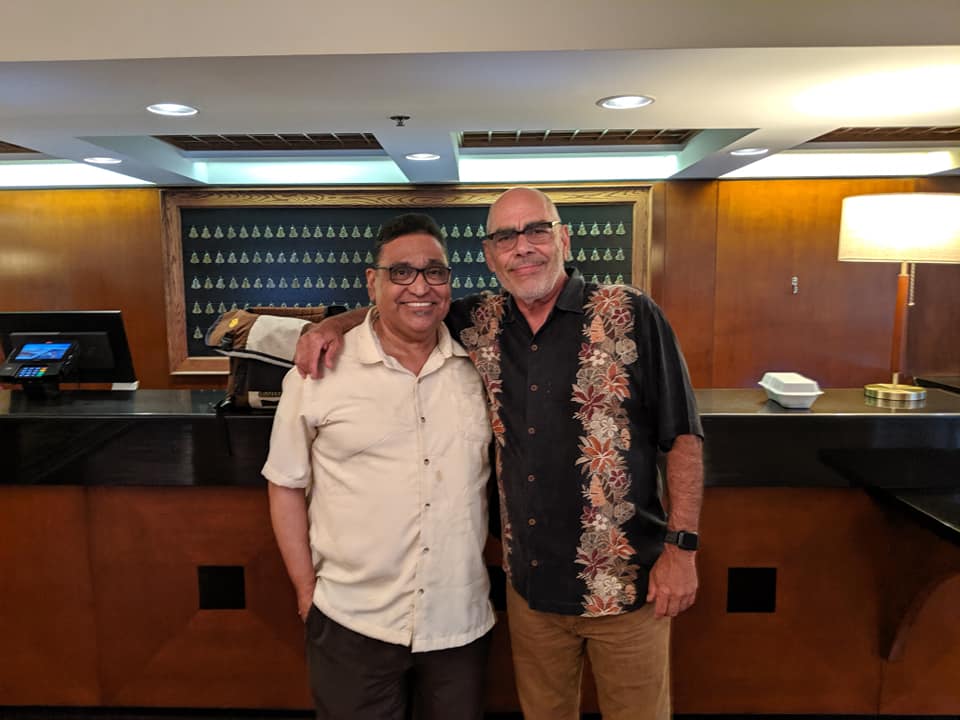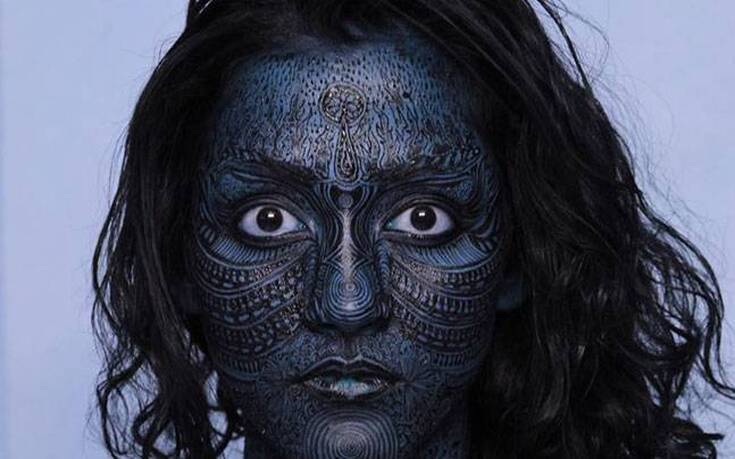|
Jimmy Santiago Baca… writer, poet and a real human being
by David Alberto Muñoz We have been doing this event for the last 12 years. Every time we have managed to bring an important personality from the Chicano culture and also from the Hispanic culture. This year is no exception. However, I would like to say a few words about what this event means not only to me but to a whole lot of people that work every year to make the event possible. I cannot begin my speech without recognizing the tremendous amount of work that my wife Mireya and my daughter Mirita have done for the pass 12 years. It sounds very easy to say it, but more than a decade ago we have been getting together to show our literature and to celebrate one of our own who has made it to in the literary world. I also need to say thank you, to a man I have known for more than 20 years. Dr. Manuel de Jesús Hernández, el Profe, a veces le hablo de tú, a veces de usted. But without his support this event could not have been what it is today. And there are many of you who have been here all these 12 years, and we have seen a lot of people go by, and realized that the Mexican-American culture, the Chicano culture, the Mexican culture, the Hispanic culture is alive and well in this part of the Southwest. And in the midst of a very angry community who is yelling: “Out with the immigrants”, we have managed to see ourselves going by not only working hard, but by creating literature, a voice that somehow certain people do not want us to use. But with the help of individuals like Miguel Méndez, descanse en paz, Luis Valdés, Sandra Cisneros, Laura Esquivel, and today, Jimmy Santiago Baca, we can continue and we will continue until there is not more air inside our lungs. Tonight, we give tribute to a truly amazing individual. Every time I stand here taking about our guest, I try to speak and tell you how these writers has influenced me in my life as a human, as a writer and as plain observant of the complex human experience. And I need to share with you that tonight Jimmy Santiago Baca, came in with a force that I could not have imagined. I am not talking only about the voice, the strength, the subject matters of his poetry and writing. But also, I am talking about his personal experiences in this planet. How he was abandoned by his parents, how he was turned into a street boy, who only needed a dictionary, paper and a pencil, to star his amazing climb into the spotlight. When I first learned that he taught himself to read with the help of a dictionary I became numb. In my limited imagination, I could not conceive even the possibility of this story being true. But in spite my stubbornness, Jimmy Santiago Baca, was able not only to become a free man, but a voice that was given to a number of individuals who did not have any voice at all. Jimmy, what has impressed me the most about your work, is your honesty. You don’t mess around with letters and beautiful metaphors, to illustrate a point. You do present ideas in very clear and sometimes rough way. Why? We must ask… because life is just the way it is. We cannot change it. We could change our behavior in order to be at peace with the laws of the land, but through your writings one recognizes the difficulties in life, but at the same time your letters shined with hope. In your book A Place to Stand, a character by the name of Chelo, tells you the following: "They want to make me forget who I am, the beauty of my people and my heritage, but to do it they got to peel my skin off. And if they ever do that, they'll kill me doing it----and that's good, because once they make you forget the language and the history, they've killed you anyway. I'm alive and free, no matter how many bars they put me behind." This is a believe your narrative Jimmy. As a minority group, we Hispanics, Chicanos, Latinos, whatever name you want to have for us, we have been under attack for the last 200 years, from the culture in power, within main stream society. And you are proof, that they have not manage to destroy our gente. Gracias a los dioses del maíz, we still have our language ¿qué no? We still share our history, and just like in the case with Chelo, we are still alive, you are still alive, and we are all expressing a voice that has to be express. ¡Con el debido respeto, pero chingada madre! You came to show the entire Chicano community, that even in jail, they cannot take away who we are. It is a privilege for me, to introduce tonight, a man, a writer, a Chicano, and I am hoping in the future to call him my friend. Damas y caballeros, con ustedes Jimmy Santiago Baca. © David Alberto Muñoz
0 Comments
Different voces…
Un texto bilingüe por David Alberto Muñoz —Siempre me han hecho menos los Chicanos… al menos a mí... toda la vida diciéndome que no sé pronunciar bien el inglés… que no puedo aprender a pertenecer a un lugar que no es mío… Yo les digo que mi familia siempre ha estado aquí. Desde antes que llegaran los señores Güeros, dueños de las tierras. Hubo muchas familias, a quiénes la frontera los saltó, no de la otra forma. El español siempre ha sido el idioma principal en mi casa, y sí, aprendimos inglés, pero yo estoy yendo constantemente a México, tratando con la gente de allá, los sonorenses, los de Sinaloa, en fin… Yo soy ciudadana de este país, por nacimiento… no entiendo por qué tratan de hacerme, menos… —A lot of us feel frustrated because it is not the people necessarily that is bothering us, it’s the culture they bring in. Yes, Mexicans come to USA with their culture, their language, their way of life that is different than ours. And this is America, we do things in English, we celebrate Thanksgiving! We celebrate the 4th of July, not the 5 de Mayo, although now a days, it has become a very nice celebration. Most people still think that 5 de Mayo, is when the Mexicans got their independence from the Spanish, but no, it is not Mexican Independence Day, it is a strange battle they fought against the Napoleonic army of the French, and they won somehow. But my point is, if anyone has become or wants to become an American, they need to learn the language, they need to know the history of this nation. It just does not make any sense to me. —Yo he vivido en los Estados Unidos ya por muchos años. Incluso, debo de ser honesto, ya casi no celebro el 16 de septiembre. Y no es que haya dejado de ser mexicano, como nos critican del otro lado del río. Nos dicen, ya no eres mexicano como yo. Nuestras tradiciones están desapareciendo en tus nuevas tierras, no es igual. And do you know what? Maybe you are right! Ya tengo más de 30 años de vivir en suelo rojo azul. Me he aculturado como yo mismo no tenía idea. He aprendido a respetar la ley, aunque te confieso que me ha costado trabajo. Tan fácil que era pagarlo todo con una mordida. O ir a ver al amigo, del amigo, del conocido que tiene un contacto en la Secretaria de Comercio, que quizás nos pueda ayudar. He aprendido a celebrar el Día de Gracias, por ejemplo. En este país he logrado salir adelante. Mis hijos son bilingües, yo trabajo de gerente de un Walmart. Y esa posición no se la dan a cualquiera. Yes, I know there still racism in this nation! Pero… vivimos mejor que cuando estábamos en México. —We have lost the real meaning of the American Dream, we used to talk about it lots of times. But now a days, it is not the nation that receives you gladly. Quite the opposite. It is a very angry nation that rejects immigrants. We used to be different people, more humane, now a days it is all insults, bullying, whoever doesn’t agree with you is not patriotic, is not a real America. What we have to do now is to scream very loud, and to show people how angry we are. We want to bring America back again. I don’t think the nation has moved. It is still in the same place. What has changed is the ideology of the people. It is not a melting pot anymore. It is a meal that does not want to blend with another, especially if they are from a different color, if they speak a different language, if they are different than us “Americans…” We need to eliminate them. We want to create a nation of plastic. With no sense of reality. Just that image of a red individual showing all his anger. Yes… this is America… This is the land of the free… —Nosotros venimos desde Guatemala. Tuvimos que salir del país porque me amenazaron de muerte a mí y a mi familia, si no les ayudaba a vender droga. Sí, en Guatemala, todo lo controla la Ganga. No importa el nombre, son bien desgraciados todos, no hay trabajo, el gobierno no hace nada y uno… pues uno nada más queda al borde de aquellos que tienen poder sobre nosotros. Mi hija ya tiene edad. La chamaca cumplió 16 años, y todos nos decían, esa niña la van a violar, llévatela mejor. Y a la noche siguiente la quisieron raptar, gracias a Dios pudo escaparse. Pero tuvimos que dejarlo todo, solamente la ropa que pudimos traernos y algunos objetos personales. No tenemos casa, trabajo, nada, solamente deseamos un lugar dónde no se nos amenace a cada rato. ¿Sí me explico? A mí esposa la violaron en el tren… sí… ese que le dicen la bestia… vestías los putos esos que lo hicieron enfrente de mí…. Hijos de puta… —Es un problema que parece no tener solución. Los políticos nada más en año de elección dicen que van a pasar una reforma de inmigración, o que se debe de terminar de construir el muro, o que la chingada y media. Nadie hace nada. El presidente Trump se ha puesto bien mula… Llevamos ya 5 meses esperando que nos llamen, y nada… Nos podríamos quedar en México… pero es más lento y largo el sistema… ¿Qué haría la gente en el poder en nuestra situación? —I think those people should not be allow to enter our nation. They are illegal aliens. They break the law, plus I don’t think we can receive more asylum petitions. Everyone wants to come to America. Why must we be the place where everybody leaves all their people? It is not fair. This is our nation and we must take care of Americans first. These people destroy neighborhoods, when you walk in front of their houses it is al a mess. Furniture, boxes, old stuff, it is not clean! Do you know what I mean? —We believe racism is alive in the nation. But we are millenniums. We don’t need to make a big deal about it. Maybe our parents because they lived in different times. Although… well… we must try to move forward. My generation does not see what the older generation saw. We are all different and I think most of us just accepts everyone as unique. I don’t think we need to keep that narrative of hate, discrimination and all the rest. ¡Somos todos iguales ese! —A mí me cuesta mucho trabajo entender la situación. Mis papás vinieron de México hace muchos años. Yo he vivido sólo en este país. Es mi nación, mi tierra. I speak two languages, Bueno, tres si cuentan el mentado Spanglish. No sé qué se siente no tener casa. Ayer, fuimos un grupo de amigos y yo a la frontera. Mucha gente amontonada. Los oficiales gringos más mal encarados que de costumbre. El rostro de las personas que esperan poder entrar a los Estados Unidos, la verdad es hasta medio dramático, es denigrante tener que pedir ayuda de esa forma… creo yo… I don’t know… I have never experienced something like that. Lo que sí puedo decir, es que se supone que en los Estados Unidos, tenemos compasión por el prójimo. Siempre nos han enseñado eso en la escuela, que el motivo de la estatua de la libertad se convirtió en un símbolo en Estados Unidos representando, en un plano más abierto, la libertad y emancipación con respecto a la opresión. Es más, hay un poema, que se encuentra en el pedestal de la estatua, y que se nos ha repetido año tras año en la escuela. "Give me your tired, your poor, Your huddled masses yearning to breathe free, The wretched refuse of your teeming shore. Send these, the homeless, tempest-tost to me, I lift my lamp beside the golden door!" Yo siempre he pensado que la gente de este país es gente buena. Pero la verdad, últimamente, todo lo que miro es un enojo, un coraje, un odio hacia los inmigrantes, en especial hacia mi gente. Todos somos inmigrantes, todos venimos de algún lugar. ¿Por qué no se menciona eso ya más? Quizás como digo el profeta, “… la maldad se reprodujo tanto, que el amor de algunos se enfriará.” Así está el país, this is the way the nation is, dividida, divided, ¿y la gente? Como siempre, la gente sufriendo, y eso no parece importarle a nadie. © David Alberto Muñoz Abogacía
Un relato por David Alberto Muñoz Siempre quise ser abogada. Desde que estaba chiquita me fascinó los argumentos, las mentadas falacias, y la forma en la cual, los varones se pueden pasar horas y horas discutiendo. Yo le sacaba el hueso a la médula, y lo digo en serio, ya que podía ver todas las alternativas posibles, y siempre dejaba que la razón dominase mis propios argumentos. Pero cuando le dije a mi papá que quería ser abogada, se rio de mí, no sé porque le dio mucha risa. Me vio con ojos de piedad y me acarició la cabeza como si yo fuera una muñeca. Suspiraba y solamente lograba decirme: Tranquila mija, usted no necesita esa carrera, puede ser maestra o enfermera. No sea tontita mija… Siempre quise mucho a mi papá. Pero nunca supo valorarme. Es cierto, era la más chica de 3 hermanos hombres, y cada uno de ellos era la gran cosa de acuerdo con mi padre. Omar, el más grande, dizque quería ser negociante igual que mi papá. Pero era más tarugo que cada vez que mi papá lo mandaba representando a su empresa, hacía un verdadero desmadre. Ni él mismo sabía explicarlo. Luego estaba Santiago, creo que era el más inteligente de los hombres, pero era un vicioso de aquellas. Poseía carisma, estaba preparado, estudió leyes, trabajaba de representante de la empresa de papá, y además era abogado defensor en la corte pública. Y bueno, Marticito… el más pequeño de los tres, que nada más sabía hacerse el menso para que papá le diera dinero e irse por allí con mujeres y amigos. Y yo… claro… la más chiquita, nacida en otra generación, dónde se podía hacer solamente lo que la sociedad aprobaba. Mi padre me llegó a decir varias veces, para qué estudias, si un día te vas a casar y te encargarás de tu hogar, de tus hijos. Cuando gradué de enfermera sí me hizo caso, pero no era igual. Y lo repito, creo que mi padre me quería mucho, pero no tenía más visión que la que le dejaron sus propios padres. A veces no pensamos que nuestros antepasados eran seres humanos igual que nosotros, con luchas, retos, dificultades. La vida no es fácil, es muy difícil a veces, y en ocasiones nuestro propio egoísmo puede llevarnos a ser demasiado cerrados, aún con nuestra propia familia. No sé si la gente pueda imaginar la sensación de frustración, al querer salir adelante como mujer en este mundo en el que vivimos. Todos te miran con condescendencia, tú no sabes suficiente, no entiendes ciertas cosas que deben de ser pensadas más allá del pensamiento normal. Para eso hay varones mijita, mi padre me decía. Para guiar cuando las mujeres tienen sus problemas del mes, o su a veces exagerada reacción emotiva. Yo pensaba, no me voy a dejar, controlaré mis emociones, mi periodo mensual lo viviré en privado sin quejarme con nadie. Y siempre… siempre trabajaré para mostrarle a mi padre que sí tengo la capacidad, y que el hecho de ser mujer no debe de afectarme en lo más mínimo… Nunca lo logré… nunca pude llenar las expectativas de mi padre. Él era un buen hombre, amaba a su familia, sus hijos, su mujer, pero nunca pudo ver más allá de su propio mundo construido por falsas paredes de supuesta realidad. Incluso cuando estaba en el hospital, ya desahuciado, siempre hablaba con los enfermeros hombres, les decía doctores, a todos, aunque no lo fueran, disculpen a mi hija, es una enfermera graduada, pero como podrán imaginar, todavía le falta mucho. Yo le agradezco que esté aquí conmigo. Mis ojos solamente se llenaban de lágrimas y me tragaba todo mi orgullo y todo mi deseo de gritarle y decirle que no era solamente enfermera registrada, sino que ya tenía una maestría en enfermería y que sabía tanto y más que todos los que estaban en aquel cuarto de hospital. Pero mi padre murió en silencio… con esa sonrisa que siempre tuvo… con esa forma tan especial de ser, se nos fue… sí… se nos fue una tarde, en medio de diagnósticos pasados de moda, opiniones enterradas en los cerebros, detrás de la eficiencia argumental de la niña, mi padre se nos fue, y aunque nunca pude llenar sus expectativas, lo quise… mucho, lo quiero, y sí… tal vez en mi corazón de niña permanece el deseo de escuchar aquel alago que nunca llegó… Siempre quise ser abogada… pero mi padre nunca me dejó… © David Alberto Muñoz Sueño
Un minicuento Por David Alberto Muñoz Era una noche de insomnio. Por más que había intentado dormir, Morfeo no estuvo presente. Su mente anduvo entre reproches a si mismo, palabras mal interpretadas, recuerdos nunca vividos y deseos reprimidos. Era simplemente un varón, ahogado en su propia sangre, junto a él, la diosa Kali levantaba su cabeza recién cortada, pero él podía todavía sentir, no el latir de su corazón, no la sangre fluyendo por su organismo ya muerto, sino aquel profundo sentimiento de desprecio por parte de aquella hembra… Despertó… estaba soñando… se tentó la cabeza para asegurarse que estuviera en su lugar… Se rio con cierta ironía. Ya no vio a Kali, ni a Morfeo ignorándolo, simplemente vio su alma siendo olvidada por ella… Así somos todos habló él, llenos de desprecio para el otro, y llenos de un amor enfermizo por quién nunca nos va a hacer caso. Lo que más duele en la vida es el deprecio de alguien a quién tú amas… ¡No! Habló Mictlán, Señor del Inframundo… el peor de todos los males, es el autodesprecio… Porque tú peor enemigo, eres simplemente tú mismo. Volvió a despertar… aunque había sido una noche de insomnio… pero todo… todo seguía igual… © David Alberto Muñoz |
David Alberto MuñozSe autodefine como un cuentero, a quién le gusta reflejar "la compleja experiencia humana". Viaja entre 3 culturas, la mexicana, la chicana y la gringa. Es profesor de filosofía y estudios religiosos en Chandler-Gilbert-Community College, institución de estudios superiores. Archives
July 2021
|




 RSS Feed
RSS Feed